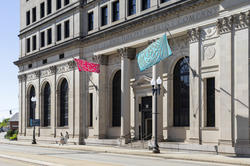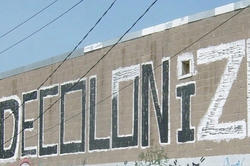Full-time faculty members to join RISD in fall 2021 as a result of the “Race in Art & Design” cluster hire initiative.
Five Questions: Jameka Hartley

Last year RISD hired a cohort of full-time faculty members focused on race, colonization, decolonization, post-coloniality, cultural representation and material practices of resistance. The educators who joined the community as part of that “Race in Art & Design” cluster hire initiative began teaching at RISD in the fall and have graciously agreed to share their unique approaches to teaching in this series of Q&As. In this interview, we hear from History, Philosophy and the Social Sciences faculty member Jameka Hartley.
Can you please say a little bit about yourself and your areas of academic focus?
I describe myself as a Black feminist scholar, but I’m also a poet. My areas of focus are Black feminism, poetry and Black motherhood. My PhD is in Interdisciplinary Studies, so I think across disciplines. I don’t think knowledge should be siloed. In reality, the world is not like that.

What attracted you to RISD?
I felt like RISD was a beautiful place to be an arts-based researcher: a social scientist and a poet. I love being an arts-based scholar, and a lot of the creative assignments I gave students in the traditional liberal arts schools where I taught before were hard for them to understand. At RISD, they understand! One student made an entire quilt that incorporated parts of the text we had read over the course of the fall semester.
“If we dismantle the structures that oppress the most marginalized people in our society, we’ll all be free. Getting the students to see that is really important to me.”
What classes did you teach in the fall semester? And what challenges and opportunities do you face teaching through the lens of decoloniality?
I taught Black Feminism, one of my favorite courses, and Reproductive Justice. Concepts like racism, sexism, patriarchy and homophobia are uncomfortable, but they’re real and we have to talk about them to create a better world. One of the things we talk about is vulnerability. I’m going to get things wrong and you’re going to get things wrong, and that’s OK as long as we can move forward in a trusting environment.
I also help them think about how their art can be activist in nature, how it can exist in the world in a productive way. In my Reproductive Justice class, we partnered with an organization called Movement for Family Power that works to abolish the family regulation system often referred to as the child welfare system. So students were able to see a real-world example of what it means to make value-based activist work. It was really exciting to see the things they came up with.

What’s the most important thing you hope students will learn in your classes?
As a society, we like to talk about the isms—racism, sexism, capitalism—as if they are sharks in the water. You better watch out for that racism! It’s gonna get you! But in reality, it’s not the shark, it’s the water. And everybody is already wet. It’s not just the classroom; it’s life outside the classroom: the media they engage with and the communities they live in. Our work is to get out of the water and onto dry land.
Another concept that guides my teaching is liberation: to create a world that allows everybody to be their full selves. The Combahee River Collective wrote the Black feminist statement in the ’70s, which says that if Black women are free, all of us will be free. To put it in the present context, if Black trans women are free, then all of us can be free. If we dismantle the structures that oppress the most marginalized people in our society, we’ll all be free. Liberation is communal, and survival is a shared burden. We have to do this together. Getting the students to see that is really important to me.
“We have to be willing to do what we’ve never done before. That’s the point: to make new history that looks better than what we had before.”
What is your take on RISD’s current state in terms of social equity and inclusion? What would you like to see the college focus on moving forward?
I think we’re at a really delicate moment where we have to be willing to make some hard choices and put actions behind them. I’m so honored to be a part of this cohort. Students have pushed for equity for a long time before I got here, and I think we’re on the precipice of something great. But we have to be willing to do what we’ve never done before. That’s the point: to make new history that looks better than what we had before.
—interview by Simone Solondz
Read the whole series and learn more about RISD’s commitments to Social Equity and Inclusion.
January 25, 2022


